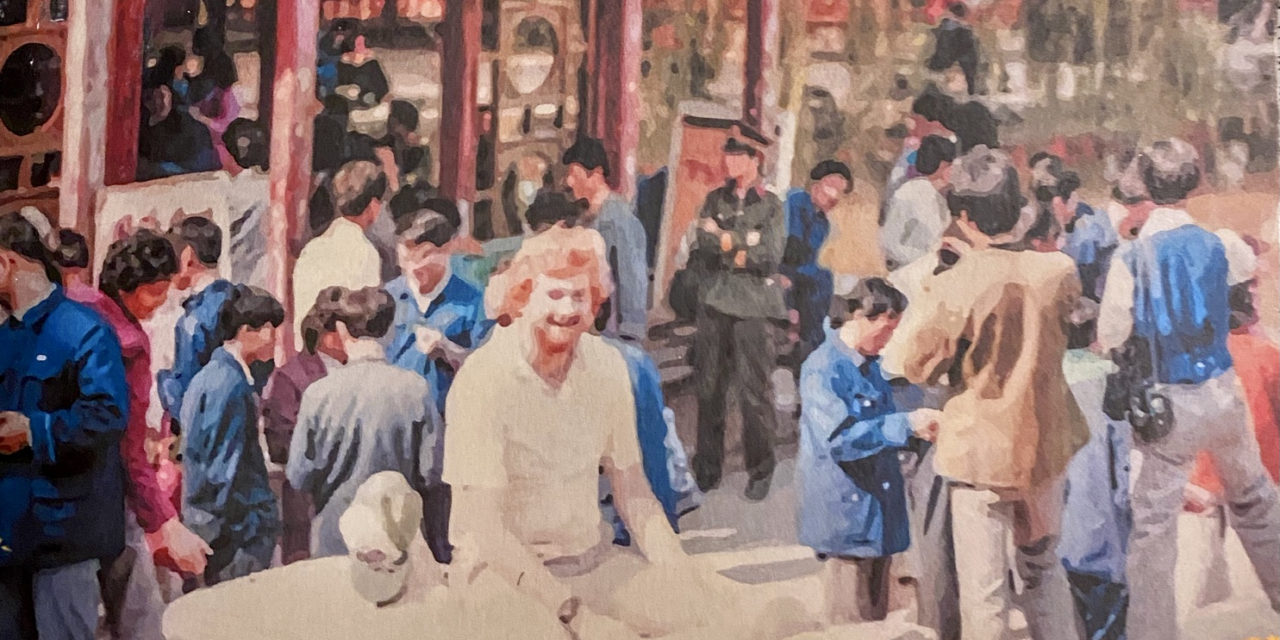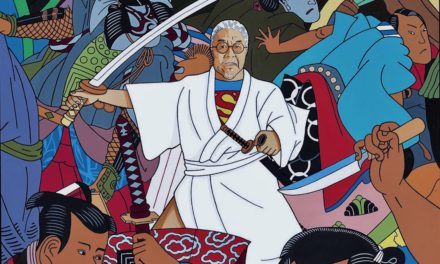By Jerry Rust
In 1935, Frederic Prokosch published a travel account of a young American traversing the path taken by Marco Polo to China some 500 years earlier. It was soon recognized that this account, titled The Asiatics, contained vivid realism and rich imagery, but that in fact it was a work of sheer imagination — author Prokosch had never left the United States. Nevertheless, the novel met with critical acclaim and to this day remains a beautiful, magical work of fiction.
Farewell the Dragon, a much more recent novel by another American writer, Lee Barckmann, stirs comparisons with The Asiatics in its broad historical view of the various peoples from the Asian steppes who spread out across Europe, central Asia and into China.

Reviewer Jerry Rust, shown here with his late wife, Zhang “Star” Yucai, who died of cancer in China on Sept. 28, 2021; photo by Paul Carter
Fictionalized though it is, Farewell the Dragon nonetheless rings of firsthand experience and authenticity, derived from the author’s own experience while he was teaching English and working in Beijing in the 1980s, soon after Deng Xiaoping, leader of the People’s Republic of China from 1978 to 1989, had declared it is “glorious to get rich” and opened China’s doors to the world and foreign capital investment.
The protagonist, a young red-haired American, discovers the bodies of two foreigners in a dorm room at a guest house, which leads to a plot of intrigue: Was it murder or a murder-suicide? How did they die? Who killed them? Now the young American became a suspect. The plot unfolds through his interrogation by police and through flashbacks, and it has something to do with an ancient and mysterious stele, a stone tablet bearing an ancient Chinese script).
The novel is loaded with references to Chinese history and culture and offers a glimpse of China in the 1980s. It’s clear that the author dug deep into his Chinese lessons at the University of Oregon:
Beijing as Chinese cities go is not a great food town. The Manchurian Qing never took to southern food. “Peking” roast duck is OK and hot pot mutton can get you through a cold night once in a while, but beyond game food and sheep, Beijing is a barbarian town where the hunter and butcher dominate the kitchen with a meat cleaver. And oddly that sort of cuisine often meets more favorably with the western palate than the food of other regions.”
Farewell the Dragon is unique in sprinkling Chinese words and characters throughout, just enough to interest the reader and carry the plot forward while not overloading westerners with Chinese characters 汉子:
We met in Tiantan (天坛), the Temple of Heaven, the most important of Beijing’s Imperial Parks. It has some old pine trees away from the Temple center and we sat under them on a low wooden bench. She brought out her erhu and in the fading daylight she played ‘Autumn Moon of the Han Palace.’ Some people stopped to listen, but at a distance, and they left us alone.
When this reviewer was a member of the Oregon delegation to Fujian Province in 1984, we visited the Temple of Heaven, the Summer Palace, Tiananmen Square, and other Beijing historical monuments. As the coronavirus global pandemic continues to extend its grip, Farewell the Dragon offers readers a vicarious way to experience Beijing’s famous sites and even some famous culinary experiences:
Yi Shanlou(乙陕楼) is one of the most famous restaurants in China. It is not large. It’s a true workers’ canteen, run by Chinese Muslims. Bare wooden tables and chairs, bowls, chopsticks and one entree, always one entree—Yangrou Paomou (羊肉泡摸—mutton stew poured over hard crumbled biscuits), all washed down with cheap, nasty white liquor, a sorghum-based spirit with a vicious kick ….
The white lightning and the good company had me on a cloud. Gang was a bum who sat on the street and played for pennies not more than two months ago. Now he is lord of the most famous workers’ den in China. During the war, Mao, Zhou Enlai, and even Peanuthead himself, Chiang Kai-Shek, ate here and drank here at Yi Shanlou as the city changed hands.
Another aspect that interested this reviewer were the many characters from various countries who all found themselves in Beijing at the time — various Europeans, an Australian, American CIA, and others, mixing with various Chinese people, all desperately seeking and sometimes finding work, love, sex, and the deeper meaning of life. For China watchers, Farewell the Dragon is an intellectual feast, and it delivers an emotional wallop.
Farewell the Dragon, published in 2017, was Lee Barckmann’s first novel. His most recent novel, The Swiftpad Extinction: The Final Volume of the Swiftpad Saga, is the last in the Swiftpad Trilogy.
Lee Barckmann’s books are available online at Barckwords.com or on Amazon. The author lives in Wilsonville, Ore.
(Lane County resident Jerry Rust — co-founder of the Hoedads reforestation group in 1971, 20-year elected Lane County commissioner starting in 1977, and author of both fiction and nonfiction works — has spent much time in China, participating in trade delegations, teaching English in Chinese schools, and participating in daily life with his late wife, Zhang “Star” Yucai’ and her family in Yantai, Shandong Province.)









